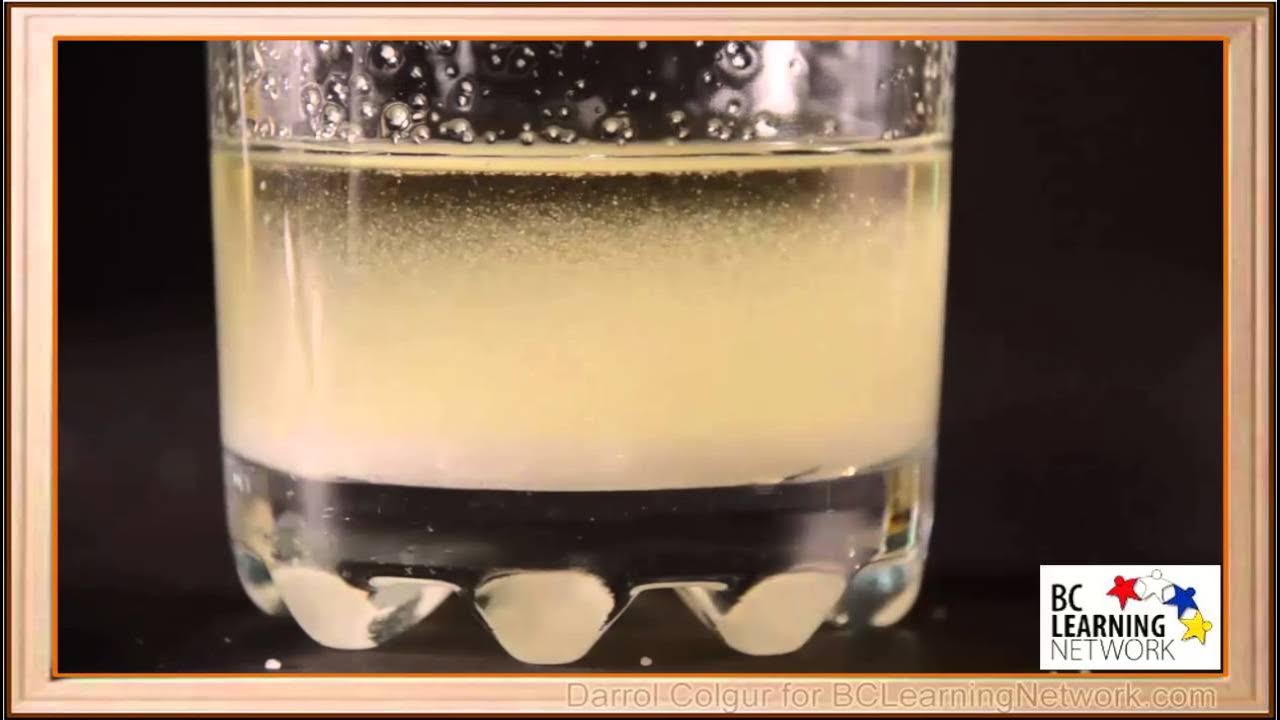LIke dissolves like. What does this mean?
Summary
TLDRThis video explains solubility concepts through experiments demonstrating how different substances interact with solvents based on their molecular properties. It highlights that ionic compounds like copper sulfate dissolve in water due to strong interactions with water molecules, while they don't dissolve in nonpolar hexane. Additionally, iodine's solubility is examined, showing it dissolves in hexane (due to similar weak intermolecular forces) but not in water. The video reinforces the principle 'like dissolves like,' emphasizing how the nature of intermolecular forces determines solubility in different solvents.
Takeaways
- 😀 Nonpolar liquids like hexane have weak intermolecular forces and do not dissolve ionic compounds such as copper sulfate.
- 😀 Ionic compounds like copper sulfate are insoluble in hexane due to weak interactions between hexane molecules and the ions in the ionic compound.
- 😀 Water, a polar solvent, can dissolve ionic compounds like copper sulfate because the interactions between water molecules and ions are strong enough to overcome ionic bonds in the solid.
- 😀 The copper ions and sulfate ions dissolve in water because of the strong electrostatic interactions with water molecules (hydrogen bonding with water’s oxygen and hydrogen atoms).
- 😀 Iodine is not very soluble in water because of the strong hydrogen bonding between water molecules that inhibits forming favorable interactions with iodine molecules.
- 😀 Iodine is much more soluble in hexane than in water, as both iodine and hexane interact through weak Van der Waals forces, which are easy to break and reform.
- 😀 The dissolution of iodine in hexane involves breaking weak Van der Waals forces in both hexane and iodine and forming similar weak interactions, leading to no significant energy loss or gain.
- 😀 Solubility can be understood by the principle 'like dissolves like,' meaning substances with similar intermolecular forces (like Van der Waals) will dissolve more readily in each other.
- 😀 Hexane and iodine both rely on Van der Waals forces, which are weak compared to hydrogen bonds in water, explaining why iodine dissolves better in hexane.
- 😀 In the case of copper sulfate in water, the dissolution process is endothermic, as the bond-breaking process requires energy, but this energy is balanced by the formation of stronger interactions with water molecules.
Q & A
Why does copper sulfate not dissolve in hexane?
-Copper sulfate does not dissolve in hexane because hexane is a nonpolar solvent, and the strong ionic bonds between copper and sulfate ions cannot be replaced by the weak Van der Waals forces between hexane molecules and the ions.
What happens when copper sulfate is added to water?
-When copper sulfate is added to water, the copper and sulfate ions dissolve because water molecules, which are polar, interact strongly with the ions, breaking the ionic bonds in the solid and forming new bonds with the ions.
Why is iodine not soluble in water?
-Iodine is not soluble in water because the strong hydrogen bonding between water molecules and the weak London dispersion forces between iodine molecules are not sufficient to dissolve iodine in water.
Why does iodine dissolve in hexane?
-Iodine dissolves in hexane because both substances are nonpolar, and the weak Van der Waals forces between iodine and hexane molecules are strong enough to overcome the intermolecular forces within each substance, allowing iodine to dissolve.
What principle is demonstrated by the solubility behavior of iodine in water and hexane?
-The principle demonstrated is 'like dissolves like,' meaning nonpolar substances, such as iodine, dissolve more readily in nonpolar solvents, like hexane, and ionic compounds dissolve better in polar solvents, like water.
What role do intermolecular forces play in solubility?
-Intermolecular forces are crucial in determining solubility. Solvents dissolve solutes when the interactions between the solvent molecules and solute particles are strong enough to overcome the forces holding the solute particles together.
Why is water a better solvent for copper sulfate than hexane?
-Water is a better solvent for copper sulfate because water molecules can form strong interactions with the copper and sulfate ions, overcoming the ionic bonds in the lattice, while hexane lacks such polarity and cannot interact effectively with the ions.
What are the types of interactions involved in the dissolution of copper sulfate in water?
-The dissolution of copper sulfate in water involves breaking hydrogen bonds between water molecules and the ionic lattice of copper sulfate, followed by the formation of new bonds between water molecules and the copper and sulfate ions.
How do the intermolecular forces in hexane affect its solubility with iodine?
-In hexane, the weak Van der Waals forces between hexane molecules allow iodine, which also experiences Van der Waals forces, to dissolve by forming similar weak interactions between iodine and hexane molecules.
Why does iodine not dissolve in water despite being a molecular substance?
-Iodine does not dissolve in water because the molecular iodine interacts poorly with the polar water molecules. The strong hydrogen bonds between water molecules cannot be easily broken to allow iodine molecules to interact with water.
Outlines

このセクションは有料ユーザー限定です。 アクセスするには、アップグレードをお願いします。
今すぐアップグレードMindmap

このセクションは有料ユーザー限定です。 アクセスするには、アップグレードをお願いします。
今すぐアップグレードKeywords

このセクションは有料ユーザー限定です。 アクセスするには、アップグレードをお願いします。
今すぐアップグレードHighlights

このセクションは有料ユーザー限定です。 アクセスするには、アップグレードをお願いします。
今すぐアップグレードTranscripts

このセクションは有料ユーザー限定です。 アクセスするには、アップグレードをお願いします。
今すぐアップグレード5.0 / 5 (0 votes)






